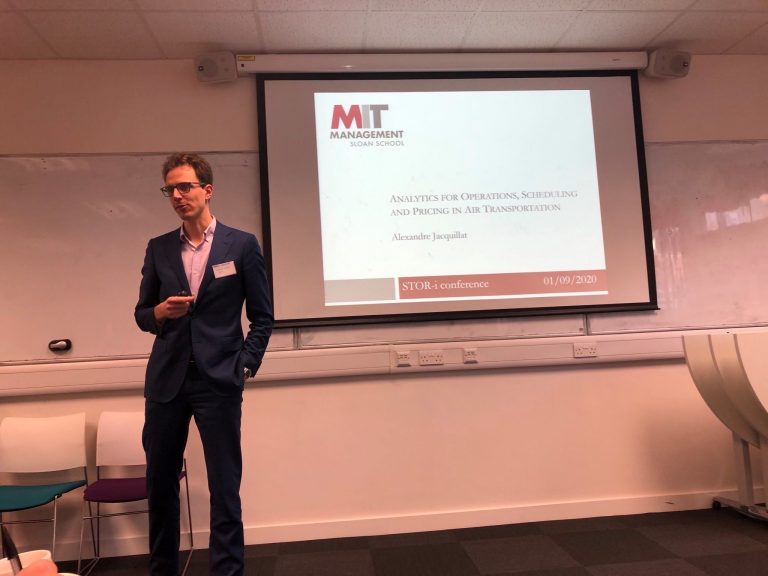For this weeks blog post I wanted to branch out of the statistics field and into operational research. To do so I am going to focus on the talk given by Alexandre Jacquillat who opened the 2020 STOR-i Annual conference back in early January. For more details on the STOR-i Conference and an in depth look at Tom Flowerdew’s presentation on fraud detection please see my previous blog post.
Alexandre Jacquillat is an assistant professor of OR and Statistics at the MIT Sloan School of Management. His research focuses on applications in transportation systems to promote more efficient scheduling, operations and pricing using predictive and prescriptive analytics. This was the discussion point of his talk given at the 2020 STOR-i Conference, with a particular focus on the airline sector.

The work Jacquillat is doing is particularly vital as the transportation sector is transforming, with new technologies such as electric cars and ride sharing emerging, as well as, an increase in demand which is limited by capacity. His work aims to meet this rise in demand, whilst offsetting the costs of congestion.
In particular, the airline sector is a rapidly growing industry with a limited infrastructure. Most airlines are currently running at or above capacity which is what causes delays in departures and landings, incurs a cost to the airline and wastes valuable resources. The challenges surrounding airline operations, scheduling and pricing is a very current topic in the OR field, with the ultimate goal of improving efficiency and profitability in the industry.
I’ll be breaking this blog post down into the three sections discussed in Jacquillat’s talk: operations, scheduling and pricing within the airline sector.
Operations
The operations within airports are limited in capacity, as stated above, most airlines are operating at or above capacity which can cause severe delays. In order to balance capacity and demand and reduce delays and holding, Air Traffic Flow and Capacity Management (ATFCM) initiatives are implemented. One such initiative is the ground delay program, in which planes are held at departure airports if there is a delay to reduce cost and environmental impact, compared to waiting in the air for landing.
Jacquillat proposes modelling this as an optimization problem, in which our objective function is the cost of aircraft delay plus passenger delays constraint to: flight operating constraints, airport capacity constraints and passenger accommodation constraints. This aims to balance flight-centric vs. passenger-centric delays. It is important to consider both delay types, as there is not a direct correspondence between flight delays and passenger delays. Many passengers are on multi-flight itineraries where one small flight delay could cause them to miss multiple further flights and cause a large passenger delay.
Scheduling
Airlines are scheduled time slots for departures/arrivals through a request process. Some time slots are more in demand than others and this demand is often far greater than the capacity. Due to this, some airlines are not allocated their requested slot and instead a process needs to be implemented to ensure fairness in which alternate slot they receive. There is then a Slot conference in which allocated slots can be traded and changed.
This forms a complex slot allocation problem in which connection times and regularity of slots needs to be considered; but also, decisions regarding priorities in terms of historic slots (same airline allocated the same slot), new entrants and change-to-historic slots needs to be considered.
Jacquillat again proposed an optimization problem to allocate slots. To do so he suggested an objective function that minimizes the displacement of allocated slots from the airline’s original request. This objective is subject to the constraints:
- Slot displacement: The difference between the slot time requested and those allocated.
- Flight connections: The time to make a connecting flight is not over or under the allowable threshold i.e. there is enough time to make the connection or not too long to wait between connections.
- Runway capacity: the allocation does not exceed the total number of flights that can depart or arrive at an airport during the time slot.
- Terminal capacity: the number of people within the terminals waiting to depart or arriving does not exceed the allowed safety limits.
In order to solve this problem, Jacquillat suggested breaking the requests into subsets using an “Adaptive Destroy and Repair” approach which provides a relatively fast and high-quality solution. For more information about this method I would suggest reading the paper: “A Large-Scale Neighborhood Search Approach to Airport Slot Allocation” whose details I’ll leave in the references below.
During the conference, Jacquillat also presented an integrated approach to scheduling and traffic flow management that took into account the slot requests and airport capacity, as well as, passenger and aircraft itineraries. To do such a problem he proposed a two-stage stochastic integer programming model.
Pricing
The next thing to discuss was how to price airline tickets when compared to competitors. In general, the price of a ticket increases closer to the time of the flight, however a lead-in fare (the starting price) is made public. Good flights will move quickly up the price ladder, whereas less popular flights will stay at the lead-in fare for a longer period of time.
Jacquillat suggested a multi-control-group experimental design conducted on a global airline to test a new practice for airline pricing under competition. This is his current work that is in the process of being published.
I thoroughly enjoyed Alexandre Jacquillat’s presentation, which gave an insight into several solutions within a highly relevant application. I look forward to getting more exposure to OR topics and their applications in the future and in particular at the 2021 STOR-i conference. I’ve listed below some references and further reading into the topic. Thanks again Alexandre!
References & Further Reading
- Ribeiro, N., Jacquillat, A., Antunes, A., (2019). A Large-Scale Neighborhood Search Approach to Airport Slot Allocation. Transportation Science 53(6). https://pubsonline-informs-org.ezproxy.lancs.ac.uk/doi/abs/10.1287/trsc.2019.0922
- Ribeiro, N., Jacquillat, A., Antunes, Odoni, A., Pita, J., (2018). An optimization approach for airport slot allocation under IATA guidelines. Transportation Research Part B: Methodological. https://www.sciencedirect.com/science/article/pii/S0191261517304538?via%3Dihub
